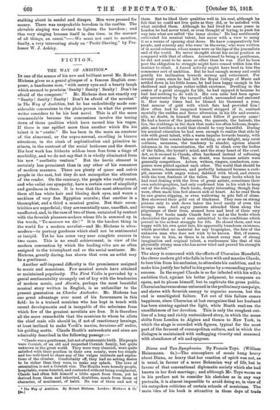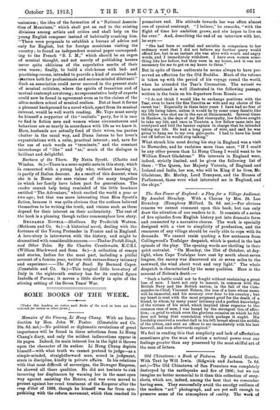Diana and Two Symphonies. By Francis Toye. (William. Heinemann. 6s.)—The
atmosphere, of music hung heavy about Diana, so heavy that her reaction of spirit was not, as is usual, in favour of a more Bohemian way of life, but in favour of that conventional diplomatic society which she bad known in her first marriage; and although Mr. Toye warns us in his preface not to consider his sketches as in any way portraits, it is almost impossible to avoid doing so, in view of his outspoken criticism of certain schools of musicians. Tbe main idea of his book is attractive in these days of trade
aunionism ; the idea of the formation of a " National Associa- tion of Musicians," which shall put an end to the existing divisions among artists and critics and shall help on the 'young English composer instead of habitually crushing him.
There were proposals to establish a bureau of advice not only for English, but for foreign musicians visiting the country ; to found an independent musical paper correspond- 'ing to the French " S. I. M.," which should be an organ -of musical thought, and not merely of publishing houses never quite oblivious of the superlative merits of their
• own wares; finally, to build a club-house with bed- and practising-rooms, intended to provide a kind of musical head- ,civiarters both for professionals and serious-minded dilettanti." Such an association could never succeed in the present state -of musical criticism, where the spirits of transition and of 'mutual contempt are strong ; no representative body of experts 'could now be found in agreement even as to the claims of the -ultra-modern school of musical realism. But at least it forms .a pleasant background to a novel which, apart from its musical interest, would be well worth reading. Mr. Toye must surely be himself a supporter of the " realistic" perty, for it is rare to find in fiction men and women whose circumstances and behaviour are so nearly in accordance with life as we know it. Here, husbands are actually fond of their wives, tea parties -chatter in the usual way, and Diana listens to her lover's .expostulations with a calm, practical interest ; and, save for 'the use of such words as " terminate," and the constant interchange of " like " and "as," much of the dialogue is 'brilliant and delightful.















































 Previous page
Previous page